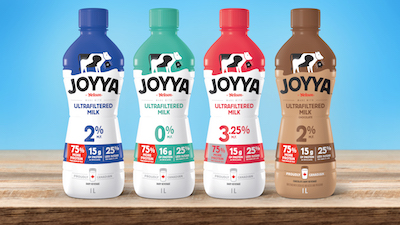
100 per cent Canadian ultrafiltered milk launches in Canada
By Food in Canada staff
Products Business Operations Processing Dairy
Saputo has launched JOYYA ultrafiltered milk, an all-Canadian dairy product that contains up to 16g of protein per 250ml serving. It’s produced in Canada, by Canadians for Canadians, and offers 75 per cent more protein and 25 per cent less lactose (sugar) than regular milk.
As regular milk has been challenged recently by trendy plant-based alternatives, Saputo commissioned a nation-wide survey with Maru/Blue* to understand Canadians’ milk consumption habits and preferences.
Despite the rise of milk-alternative trends and a very cluttered dairy aisle, the survey revealed that 87 per cent of Canadians still drink or cook with milk regularly and 40 per cent consume it daily.
More findings:
- 43 per cent of Canadians choose milk for its protein and almost one third of Canadians (27 per cent) wish milk had more protein
- The biggest reason for trying milk alternatives was curiosity but over a quarter of Canadians were seeking an added source of protein, even though most common plant-based milk alternatives have less than 3g of protein per 250ml serving
- While more than half of Canadians have tried milk alternatives in the last five years, 75 per cent came back to regular milk
- Canadians are very loyal to dairy farmers, 91 per cent of people surveyed want to purchase milk produce on Canadian farms
- Canadian love milk in many ways: half of milk drinkers enjoy it by the glass; 72 per cent consume it with cereal, and just over half add it to coffee or tea
Two years in the making, JOYYA ultrafiltered milk speaks to Canadian consumer demands and provides a simple solution to help fuel their day with a little extra joy. “JOYYA ultrafiltered milk is more than milk, it is “ultramilk’’. It’s a simple choice that’s packed with unique and quauntifiable benefits,” says Kim-Tuan Nguye, vice-president, Saputo Strategic Business Development for Fluid, Bottling & Culture products.
A new milk category, JOYYA ultrafiltered milk contains no artificial flavours or colours and is made from 100 per cent Canadian milk. Like all milk produced in Canada, it is also hormone and additive free. JOYYA ultrafiltered milk takes fresh Canadian milk and passes it through a series of specialized filters. This separates the milk components to concentrate the nutrients already found in milk, such as protein and calcium, while reducing the lactose (the naturally occurring sugar in milk). Different from regular milk, JOYYA ultrafiltered milk also offers extended freshness. When unopened and refrigerated, JOYYA ultrafiltered milk stays fresh for up to 120 days from the production date. Once opened, it is recommended that JOYYA ultrafiltered milk be enjoyed within 14 days. JOYYA ultrafiltered milk is packaged in a special one litre PET ergonomic bottle for easy pouring, long lasting freshness and portability.
JOYYA ultrafiltered milk is available in a one litre format in the following varieties:
- Skim Milk (0% M.F.)– 75 per cent more protein and 25 per cent less lactose (sugar) than regular milk; 16 grams of protein per 250mL serving
- Partly Skimmed Milk (2% M.F.) – 75 per cent more protein and 25 per cent less lactose (sugar) than regular milk; 16 grams of protein per 250mL serving
- Whole Milk (3.25% M.F.) – 75 per cent more protein, 25 per cent less lactose (sugar) than regular milk; 16 grams of protein per 250mL serving
- Chocolate Dairy beverage – Partly Skimmed (2% M.F.) – 75 per cent more protein and 50 per cent less sugar than regular chocolate milk; 15 grams of protein per 250mL serving
*Survey Methodology: From October 17th to October 18th 2018 an online survey of 1,525 randomly selected Canadian adults (1,326 of whom consume regular milk) who are Maru Voice Canada panelists was executed by Maru/Blue. For comparison purposes, a probability sample of this size has an estimated margin of error (which measures sampling variability) of +/- 2.5%, 19 times out of 20. The results have been weighted by education, age, gender and region (and in Quebec, language) to match the population, according to Census data.
Print this page